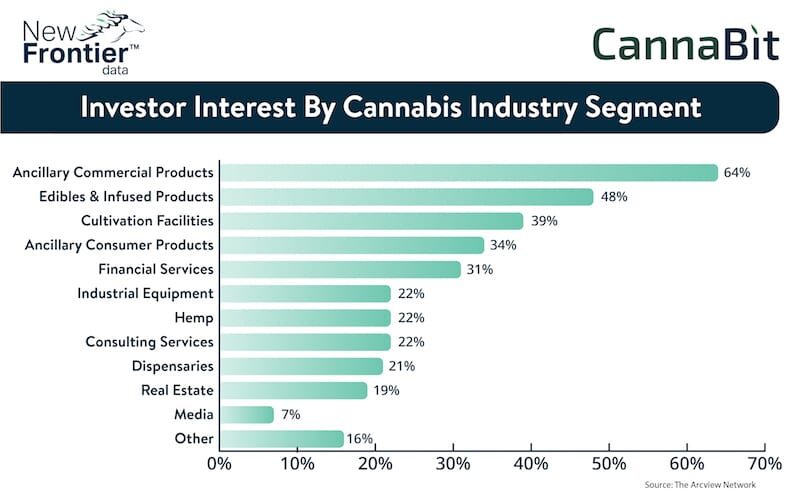Investor Interest By Cannabis Industry Segment

Images: New Frontier Data Conquered the New West Summit!
October 20, 2016
Latest Polls For Marijuana Legalization – State Ballots
October 23, 2016Investor Interest By Cannabis Industry Segment
In September 2016, New Frontier and Arcview Market Research surveyed members of the Arcview Investor Network to understand how investors at the forefront of the cannabis industry view opportunities in the sector. Overall, the members were most interested in ancillary commercial product opportunities (62%). These are products which facilitate the industry’s operations, but which do not touch the plant and are an attractive entry point because they have lower barriers to entry, face fewer regulations, and can be more easily scaled across state markets than companies which touch the plant.
Comparatively, only 21% of members were interested in dispensary operations, which are often perceived as the first point of entry into the cannabis industry. The high level of competition among dispensaries is a key reason for the lower level of interest. In markets which limit the number of dispensaries, competition for licenses is fierce, as exemplified in Arizona where over 700 applicants had competed for 31 dispensary licenses. In markets like Colorado and Washington which do not limit the number of dispensaries, completion has squeezed margins as high number of stores puts strong downward pressure on product prices.
Similarly, among the market segments that touch the plant, investors were most interested in edibles and infused products (48%) and cultivation facilities (39%). Strong interest in investing in edibles and extracts is spurred by the rapid growth in demand for these products, which now account for approximately one-third of cannabis products sold. In addition, non-flower products have been able to maintain their premium pricing better than flower products which have seen steep pricing declines over the past two years. For example, in Washington, the average price of a single gram of flower has fallen from over $40/gram to $13/gram in two years.
Other sectors of the market, including consulting services, real estate and media were of interest to less than a quarter of investors, in part due to the specialized skills or assets required to be successful in these areas of the cannabis industry.




